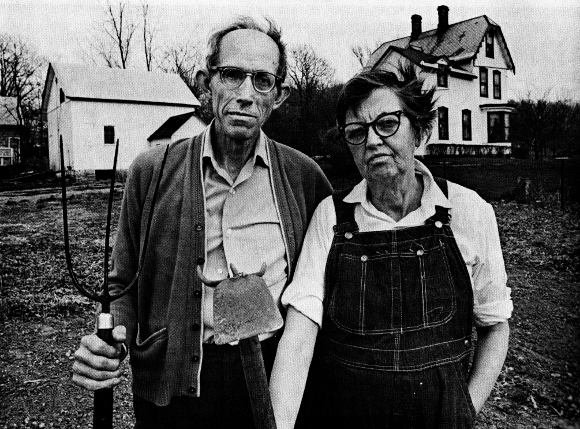Another story from Michener’s book concerns the near-execution of Thomas Watson at the hands of the Continental Army:
Thomas Watson was a worthy, exemplary Friend and thrifty farmer of Buckingham, Bucks County, Pennsylvania. During , several detachments of the American army encamped for some days in the vicinity, producing a scarcity of hay. J—— N——, who kept a tavern at Centreville, applied to Thomas to purchase a stack of hay, which he had designed to distribute among his less fortunate neighbors. He declined to sell, and told J—— that it would be opened such a day, and if he would come he should have a share of it. J—— still insisted: Do you expect to get so much? naming a sum. Thomas said, No; the hay was not worth so much. Do you expect so much? and so much? till he found about what Thomas thought it was worth. He then tendered him that amount; which was refused. But the man still persisted. At length (said Thomas) a conviction came over me that I ought to bear my testimony against such money. I turned and told him that as it was made for the express purpose of carrying on war, I had never been free to take it, and could not do so now; but, if he would come when the stack was opened, he should have a share of the hay without any money at all. That was enough. J—— immediately went and informed General William Alexander, sometimes called Lord Sterling (who was at Newtown with a detachment of troops), that a rich old Quaker in Buckingham had a stack of hay to sell, but would not let him have it, because he had nothing but paper money to pay for it. It was not to be endured that a stubborn Quaker should plead religious scruples for refusing the currency of Congress, because it was issued to carry on the conflict in which they were then engaged.
An order was issued to arrest the refractory Quaker, and a file of men sent to execute it. He was carried to Newtown, closely imprisoned, tried by a court martial, found guilty of refusing to take Continental money, and sentenced to be stripped and ironed, and on the next afternoon to be publicly hanged. Strenuous efforts were made for his release, but apparently without success. His nephew, Dr. John Watson, visited the family of Henry Wynkoop on the occasion. A young invalid officer lay on the floor wrapped in his blanket, and heard the conversation. At length, he raised upon his elbow and said, “Young man, you may as well go home and make yourself contented, for you may depend upon it, your uncle will be hanged.” The nephew replied, “I hope not; I do not think that the hanging of so good and useful a man, and one so well esteemed in his neighborhood, will be approved of, or do good to the cause of the people.” “If your uncle is the man you describe, he is the less likely to escape. His death will strike more terror than the death of a dozen of a different character. Lord Sterling has long been determined to make an example. An opportunity is now offered, and he most certainly will not let it pass. His Excellency (meaning General Washington) has always stood between such men and the fate they deserve; but he is now too far off to be reached before the sentence will be carried into execution. You may go home, and rest assured your uncle will be hanged.”
But the wife of the prisoner had a warm friend in the landlady of the inn at Newtown; and when was woman’s kindness ever invoked for the relief of suffering, or woman’s tact required in vain? She was advised not to apply in person for the release of her husband. The landlady had learned Lord Sterling’s fondness for the creaturely comforts of life; and knew that wine had the effect to soften the severity of his temper. To take advantage of this disposition, she invited him to a sumptuous dinner. He did full justice to the delicacies of the table, and willingly partook of the generous old wine, which had been reserved for special occasions. As the wine warmed the General’s good-nature and disposed him to kindlier feelings, she cautiously introduced the case of the condemned; pitied his condition, cold, and in irons; regarded his treatment as needlessly severe; and at length requested that his fetters might be removed and his clothes restored to him. He could not resist this appeal of his hostess; and a note was sent to the guard in answer to her request.
The good woman continued her entreaties, and still plied the wine; when, at the proper moment, the wife was introduced. She fell on her knees before him, burst into a flood of tears, and told him who she was, and, with all the earnestness, feeling, and eloquence of a loving wife pleading for the one she loved best on earth, begged him to spare her husband’s life. Her entreaties were of a nature hard to be withstood. He remained some time silent; then, raising her to her feet, he said, “Madam, you have conquered. I must relent at the tears and supplications of so noble and so good a woman as you. Your husband is saved.” He immediately wrote a pardon for the prisoner, and ordered his discharge. The happy pair now returned to their homes rejoicing.

